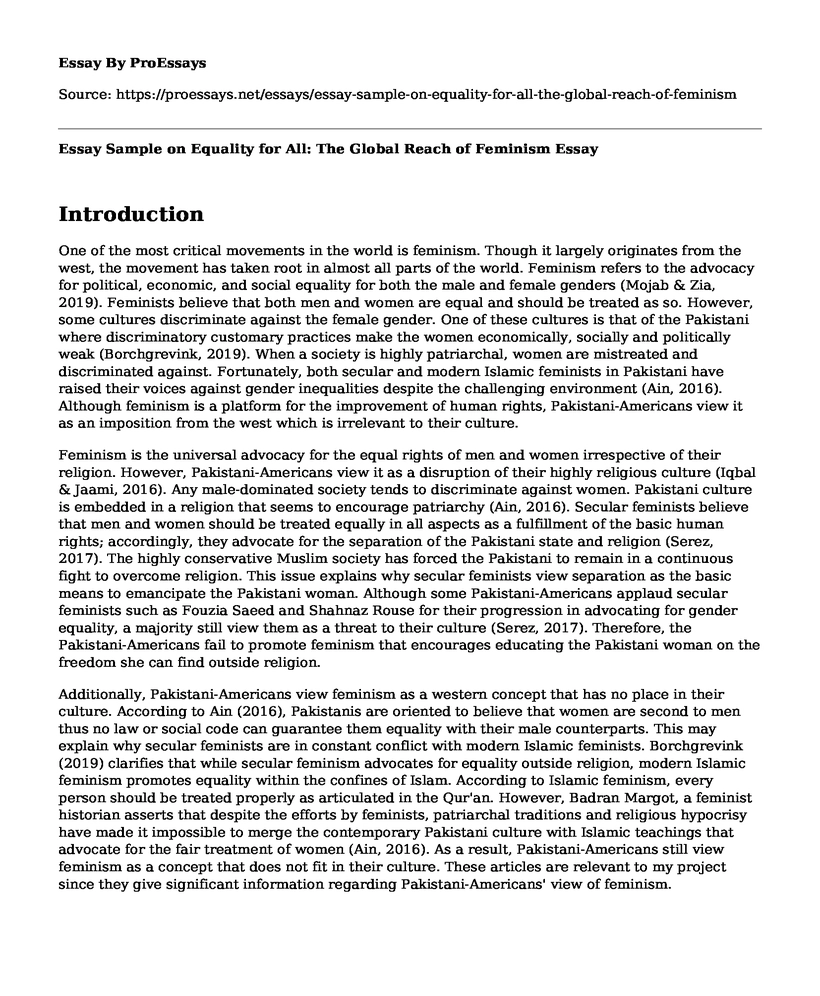Introduction
One of the most critical movements in the world is feminism. Though it largely originates from the west, the movement has taken root in almost all parts of the world. Feminism refers to the advocacy for political, economic, and social equality for both the male and female genders (Mojab & Zia, 2019). Feminists believe that both men and women are equal and should be treated as so. However, some cultures discriminate against the female gender. One of these cultures is that of the Pakistani where discriminatory customary practices make the women economically, socially and politically weak (Borchgrevink, 2019). When a society is highly patriarchal, women are mistreated and discriminated against. Fortunately, both secular and modern Islamic feminists in Pakistani have raised their voices against gender inequalities despite the challenging environment (Ain, 2016). Although feminism is a platform for the improvement of human rights, Pakistani-Americans view it as an imposition from the west which is irrelevant to their culture.
Feminism is the universal advocacy for the equal rights of men and women irrespective of their religion. However, Pakistani-Americans view it as a disruption of their highly religious culture (Iqbal & Jaami, 2016). Any male-dominated society tends to discriminate against women. Pakistani culture is embedded in a religion that seems to encourage patriarchy (Ain, 2016). Secular feminists believe that men and women should be treated equally in all aspects as a fulfillment of the basic human rights; accordingly, they advocate for the separation of the Pakistani state and religion (Serez, 2017). The highly conservative Muslim society has forced the Pakistani to remain in a continuous fight to overcome religion. This issue explains why secular feminists view separation as the basic means to emancipate the Pakistani woman. Although some Pakistani-Americans applaud secular feminists such as Fouzia Saeed and Shahnaz Rouse for their progression in advocating for gender equality, a majority still view them as a threat to their culture (Serez, 2017). Therefore, the Pakistani-Americans fail to promote feminism that encourages educating the Pakistani woman on the freedom she can find outside religion.
Additionally, Pakistani-Americans view feminism as a western concept that has no place in their culture. According to Ain (2016), Pakistanis are oriented to believe that women are second to men thus no law or social code can guarantee them equality with their male counterparts. This may explain why secular feminists are in constant conflict with modern Islamic feminists. Borchgrevink (2019) clarifies that while secular feminism advocates for equality outside religion, modern Islamic feminism promotes equality within the confines of Islam. According to Islamic feminism, every person should be treated properly as articulated in the Qur'an. However, Badran Margot, a feminist historian asserts that despite the efforts by feminists, patriarchal traditions and religious hypocrisy have made it impossible to merge the contemporary Pakistani culture with Islamic teachings that advocate for the fair treatment of women (Ain, 2016). As a result, Pakistani-Americans still view feminism as a concept that does not fit in their culture. These articles are relevant to my project since they give significant information regarding Pakistani-Americans' view of feminism.
Conclusion
Feminism is a critical perspective that seeks to improve basic human rights so that both men and women are treated equally. However, Pakistani-Americans view it as a western concept that is irrelevant to their culture. Both secular and modern Islamic feminists have constantly engaged in conflicts because of their divergent views regarding the emancipation of women (Iqbal & Jaami, 2016). The highly religious culture in Pakistani complicates matters since Islamic traditions have been distorted to relegate the status of women in society. Additionally, Pakistani-Americans do not fully support feminism thus making it unpopular among the elites who are not ready to relinquish their privileges. Therefore, feminism is not taken seriously in Pakistani culture.
References
Ain, N. U. (2016). Feminist movements leading towards emancipation or alienation: case study of Pakistan. Pakistan Journal of Social and Clinical Psychology, 14(2), 26.
Borchgrevink, K. (2019). Agents of Change: Women's Religious Practice and Development Engagement in Pakistan. Religion and Gender, 9(1), 70-92.
Iqbal, J., & Jaami, N. U. D. (2016). Influence of Feminism Movements on Pakistani Exegetes of Holy Quran. Pakistan Journal of Social Sciences (PJSS), 36(2).
Mojab, S., & Zia, A. S. (2019). Race, class, and agency: A return to Marxist feminism. Journal of Labor and Society, 22(2), 259-273.
Serez, A. (2017). Feminism in Pakistan: Dialogues between Pakistani Feminists. Laurier Undergraduate Journal of the Arts, 3(1), 4.
Cite this page
Essay Sample on Equality for All: The Global Reach of Feminism. (2023, Mar 04). Retrieved from https://proessays.net/essays/essay-sample-on-equality-for-all-the-global-reach-of-feminism
If you are the original author of this essay and no longer wish to have it published on the ProEssays website, please click below to request its removal:
- Sociology Paper Sample: Gender Stereotypes About Women
- Domestic Violence Courts Essay Example
- War on Drugs, Gang Violence, Cocaine vs. Crack Essay Example
- Child Abuse and Its Effects Annotated Bibliography Paper Example
- Women Seeking Fulfilment in Societys Expectations - Essay-Sample
- Advocacy for Survivors of Domestic Violence: Best Practices for Social Workers - Essay Sample
- Free Case Study Sample on Oil Platform Event: US Response to Iran's Attack in 1987-88







